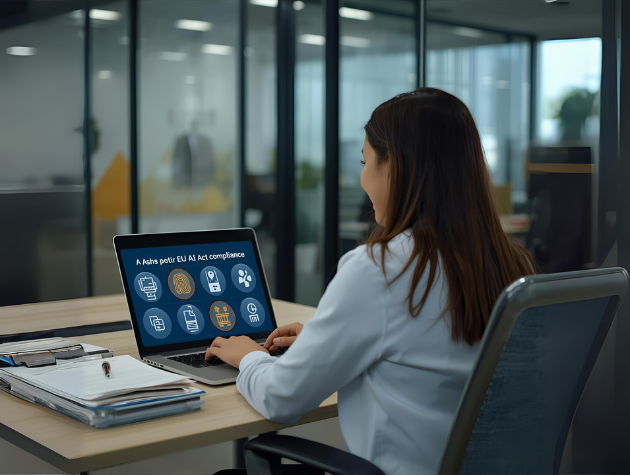An in-house lawyer reviewing compliance documents with a laptop open to AI risk management guidance. The image reflects the challenge and opportunity facing today’s corporate counsel as they confront the rise of AI in the workplace and prepare for AI audits for in-house lawyers.
Are you ready for the first AI audit at your company? For many in-house lawyers, this question brings a pit in the stomach. It’s not just the fear of regulations you don’t fully understand it’s the realization that AI is already woven into hiring platforms, compliance tools, and even everyday workplace software. And if you don’t know where those systems are, how they’re working, or what risks they carry, you’re not really in control of the AI audits for in-house lawyers.
That’s why conversations about AI audits matter right now. Much like the early days of privacy law, where GDPR and CCPA reshaped compliance overnight, AI regulation is moving quickly from theory to reality. The good news: in-house lawyers don’t need to be AI experts to lead in this moment. They just need to be proactive about AI audits for in-house lawyers.
Watch the full conversation with Kassi Burns & Humira Noorestani here:
AI Audits for In-House Lawyers: More Than a Buzzword
So, what exactly is an AI audit? At its core, it’s a structured assessment of an AI system to ensure transparency, fairness, and compliance. That means reviewing data sources, algorithms, and decision-making processes. Done right, an audit doesn’t just check a compliance box it protects the company from reputational harm, litigation, and regulatory fines.
But before you can audit, you need to know what you’re auditing. That’s where AI mapping comes in. AI audits for in-house lawyers involve mapping the process of identifying where AI tools live in your company and how they’re being used. Most in-house lawyers are surprised to discover just how many AI systems exist under the radar embedded in HR, sales, or IT functions. Without a map, the risks remain invisible.
Regulatory Triggers Driving AI Audits for In-House Lawyers
If AI audits sound like a future problem, think again. New York City’s Local Law 144 already requires independent bias audits of AI-driven hiring tools. The European Union’s AI Act is setting global expectations by classifying AI systems by risk level. And in the U.S., the EEOC has already settled its first AI discrimination lawsuit.
For in-house counsel, this isn’t abstract. It’s the opening act of a compliance era where AI audits for in-house lawyers will be as standard as privacy impact assessments. The companies that start preparing now will be the ones positioned to lead, not scramble.
What It Means for In-House Counsel
Here’s the hard truth: you can’t do this alone. The days of legal being the catch-all expert are over. The smartest in-house lawyers are the ones admitting what they don’t know and building teams around them technologists, compliance officers, ethicists, and outside advisors who can help fill in the gaps.
That humility isn’t weakness. It’s leadership. By saying, “I don’t know everything, but I know we need a plan,” you position yourself as a trusted guide rather than a last-minute firefighter.
And it doesn’t have to be overwhelming. Even a small first step like launching an AI mapping exercise signals to regulators, employees, and the board that your company is taking responsible governance seriously. Documentation is equally powerful. Regulators may not expect perfection yet, but they do expect effort. Records of your processes and reasoning show good faith, which can make all the difference when scrutiny comes.
Shifting From Fear to Strategy
Yes, AI audits feel daunting. But they’re also an opportunity. They allow in-house lawyers to move beyond simply reacting to risks and toward shaping how the business adopts technology responsibly. Instead of being seen as the department of “no,” legal can lead the charge toward fairness, accountability, and innovation involving AI audits for in-house lawyers.
So the next time someone on your executive team asks about AI audits, resist the urge to roll your eyes and call it hype. Instead, ask yourself: do you know where your company’s AI systems live, how they make decisions, and who is accountable for them? If the answer is no, it’s time to start mapping and building the foundation for audits before the regulators make that choice for you.
What’s Next for You?
This isn’t about being perfect. It’s about being proactive. Start with what you know, admit what you don’t, and build the partnerships you need. AI audits aren’t a passing trend they’re the next chapter of compliance.
Watch the full conversation here: Notes to My (Legal) Self: Season 7, Episode 9 (ft.Kassi Burns & Humira Noorestani)
Join the Conversation
At Notes to My (Legal) Self®, we’re dedicated to helping in-house legal professionals develop the skills, insights, and strategies needed to thrive in today’s evolving legal landscape. From leadership development to legal operations optimization and emerging technology, we provide the tools to help you stay ahead. AI risks, including mid-level ones, are an essential component of these discussions.
What’s been your biggest breakthrough moment in your legal career? Let’s talk about it—share your story.



